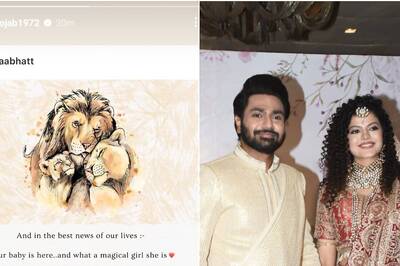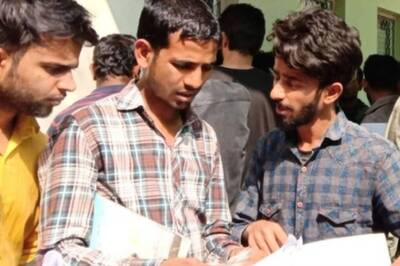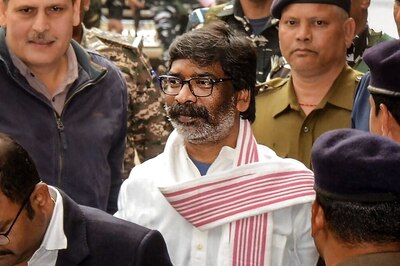
views
In Shaheen Bhatt's debut novel, I've Never Been (Un)Happier, which chronicles her long and ongoing struggle with depression, she often refers to depression as 'the Feeling.’
Bhatt rarely describes 'the Feeling' with the help of metaphors, allegories and analogies. Instead she chooses to recreate real moments from her life with strikingly vivid details to show (and not tell) her readers, the days when 'the Feeling' gets the better of her.
Bhatt's book is entirely autobiographical in nature -- it has a collection of diary entries accumulated from her formative years, suicide notes, accounts of episodes of depressions, incidents from her life that pushed her into the throes of insurmountable gloominess and her struggle with suicidal thoughts and attempts. All these fragments of her past spun together gives a haunting account of the misery and havoc depression can wreak on someone's life, sucking out every last bit of energy, and reducing their potential of any achievement.
In the book she writes:
The realisation that depression was not my identity came to me as an epiphany, but I can’t point to the thought processes that lead to this sudden understanding. I simply woke up one day tired of being boxed in by the labels I had earned over the course of the last twelve years, tired of being restricted by tags of negativity and pessimism. I wasn’t negative or pessimistic, I realized. If I was an inherently negative person I would never have been able to survive the havoc my mind wreaked. The only reason I made it through so many of my darkest days was that I had hope, a sense of humour and a steadfast belief that my pain didn’t signal the end of my life.
It is a relatable book for anyone who has suffered through depression or anyone struggling with it now but the best thing about the book is that it doesn't examine depression in isolation. It talks about other mental, physical, social problems that one faces while struggling with depression-like anxiety, insomnia, isolation and loneliness, and how sometimes people fall back on negative habits like alcoholism or overeating as a coping mechanism.
I've Never Been (Un)Happier tells you upfront that there is no one-solution-fits-all when it comes to depression, and Bhatt isn't intent on hitting the readers with kid-gloves. Her reality is rather grim but she is never morbid. Instead, she talks of acceptance of the present moment, and it's transient in nature, which means that it will soon change, and all the sadness that encompasses the person feeling depressed will fade away too.
She ends the book on a beautiful note that says:
There are still days and weeks and months when I am also consumed by depression, when I forget all my lessons, when I forget everything but the pain. And that’s also when I turn to the very idea I’m afraid of: transience.
I remind myself if happiness is fleeting, then so is sadness.
I remind myself depression is the weather, and I’m a weather-worn tree.
I remind myself even the worst storms pass.
I remind myself I’ve survived them all.
Bhatt, not only ventures into and smashes the societal taboos and stigmas associated with depression in this book but also boldly calls out our tendency as a society to fetishize happiness, and how insistent we are at all times, in hiding our feeling and vulnerability, thus forcing ourselves, and everyone around us, to lead unauthentic parallel lives on social media, in public and social gatherings, while internally struggling alone with our own negative feelings.
Bhatt writes:
Positivity culture lives by the old, overused and very misunderstood adage, ‘When life hands you lemons, make lemonade.’ This is a statement we’ve heard so consistently and for so long that it’s now accepted as gospel and we don’t even pause to question whether or not it makes sense.
In our search for silver linings, we’ve gotten so used to the idea of diverting our attention away from the clouds, that we’ve lost sight of the sky altogether. We furiously and constantly avoid or suppress negative feelings and on the off-chance that we do experience them, we make sure to tuck them carefully out of sight so as not to betray any signs of weakness. We shut down all avenues for vulnerability—shut down any situation that could leave us open to feeling pain or discomfort of any kind.
There is also another wonderful passage in the book where she denounces how we glorify pain, as a fuel of creativity, and how we are so keen on saying 'take your broken heart, make it into an art'. She is quick to point out that there is a difference between pain and mental illness, and it is important to identify that difference. "Mental illnesses can’t be seen as a means to an end or a route to greatness. It’s not, and it’s vital we understand that" she said in the book.
Bhatt has confessed in the book that it had not been an easy task to write this novel. In fact, the process of revisiting morbid days, and suicidal episodes from the past had thrust her towards depression again during the writing phase but despite that Bhatt manages to give a frank, and self-aware narrative of her life in this book.
Her life, with her 'film family' (she is the daughter of filmmaker Mahesh Bhatt and actress Soni Razdan, and sister of Alia Bhatt), is obviously a thing of interest to media, and public alike, which is why the book had created quite a stir even before it had hit the stands, but there are very few mentions of the 'film family' in the book. Except for a few fleeting instances, like when she mentions how she was once sidelined by a photographer during a photoshoot because he wanted to take pictures of the 'adorableness' of Pooja (Bhatt) and Alia without her in the frame, or that one of her worst episodes of depression was when Alia had bagged her first Bollywood film and was on the brink of stardom, there are very few mentions of Alia. Bhatt portrays her parents, as supportive and patient individuals.
Bhatt's unwavering focus in this book is her battle with depression, but she is also quick to point out that she has the privilege and is equipped with resources to fight depression on a regular basis, because of her family, and the background she comes from. But, she also adds:
"My pain is real. It does not come because of my lifestyle, and it is not taken away by my lifestyle."
I've Never Been (Un)Happier, published by Penguin Publishers, is a short book written in the lucid language. It's engaging and has an honest voice at its core.
Follow @News18Lifestyle for more



















Comments
0 comment